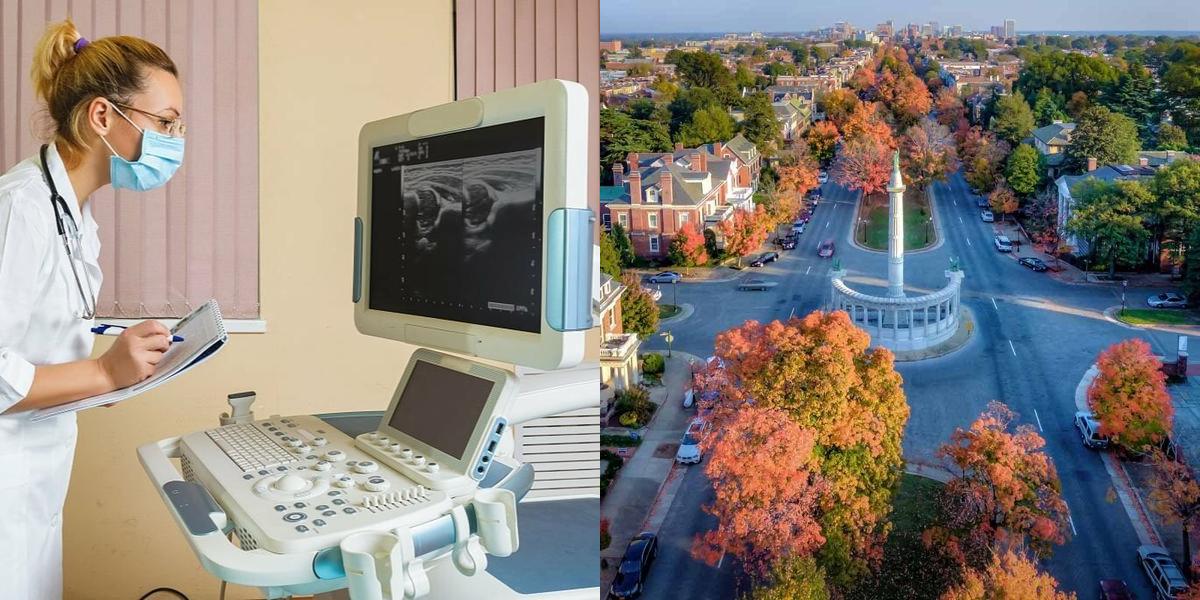How to Become a Medical Sonographer in Virginia

Diagnostic medical sonographers are in high demand across the U.S., with over 81,700 sonographers currently employed and 9,600 new jobs expected by 2032, according to the U.S. Bureau of Labor Statistics (BLS). Virginia offers a solid median salary of $86,120, with top earners making over $100,000. Whether you're just starting your career or making a change, this guide will walk you through how to become a diagnostic medical sonographer in Virginia, step by step.
Key Points
-
A diagnostic medical sonographer is a healthcare professional who uses ultrasound technology to capture internal images used in diagnosing medical conditions.
-
To become a diagnostic medical sonographer in Virginia, you need to complete an accredited program and often pursue certification through ARDMS.
-
Most programs take about 2 years to complete; bachelor's degrees take closer to 4 years.
-
Program costs typically range from $5,000 to $30,000 depending on the school and credential.
-
The average diagnostic medical sonographer salary in Virginia is $86,120, with top earners making over $100,000.
-
The profession is projected to grow 10% nationally from 2022–2032 (BLS), faster than most occupations.
Where to Find Diagnostic Medical Sonography Classes in Virginia
If you're looking for diagnostic medical sonographer classes in Virginia, Dreambound is the largest platform for students to find and compare vocational training programs.
Dreambound offers a comprehensive list of accredited programs in Virginia, including options in Virginia Beach and Richmond.
With Dreambound, you can easily explore these programs and find the one that best fits your needs and preferences.
Career Paths and Advancement Opportunities
Becoming a diagnostic medical sonographer opens the door to several career pathways, many of which offer specialization, higher pay, and advancement into leadership roles.
Specialization Options:
-
Obstetric and Gynecologic Sonography: Focuses on monitoring pregnancies and diagnosing reproductive conditions.
-
Cardiac Sonography (Echocardiography): Involves imaging the heart and assessing cardiovascular health.
-
Vascular Sonography: Captures blood flow and detects vascular conditions.
-
Abdominal Sonography: Focuses on organs such as the liver, kidneys, pancreas, and gallbladder.
-
Pediatric Sonography: Specializes in imaging children and infants.
Career Advancement:
-** Lead or Senior Sonographer**: Oversee imaging teams, train junior staff, and manage workflow.
-
Clinical Educator: Teach future sonographers in college or training programs.
-
Department Supervisor or Manager: Manage imaging departments in hospitals or clinics.
-
Application Specialist or Ultrasound Equipment Sales Rep: Work for manufacturers providing technical training or sales support.
-
Advanced Practice Roles: With further education, transition into radiology assistant, healthcare administration, or informatics.
Frequently Asked Questions
How much does a sonographer make in Virginia?
In Virginia, diagnostic medical sonographers earn an average salary of $86,120 per year (BLS, 2023). Entry-level positions typically start around $65,000, while top earners can make over $100,000 annually.
What state pays sonographers most?
California offers the highest average diagnostic medical sonographer salary at $122,670 annually. Other top-paying states include Hawaii at $111,690, Oregon at $104,260, Massachusetts at $101,420, and Connecticut at $99,610.
What is the most a sonographer can make?
The highest average salary for sonographers, according to the BLS, is $122,670 per year.
Do sonographers make more than RNs?
Yes, in many cases. While registered nurses (RNs) in Virginia earn an average salary of $83,160, diagnostic medical sonographers average slightly higher pay at $86,120.
What is the fastest way to become a sonographer?
The fastest route is through a 12- to 18-month certificate program, typically available to individuals who already hold a degree in a related field (such as radiologic technology or nursing).
Conclusion
Obtaining certification as a Diagnostic Medical Sonographer and finding a job in this field requires completing an accredited educational program, passing the certification exam, and actively seeking job opportunities. Networking and professional development are also important aspects of building a successful career as a sonographer. Once you have established yourself in the field, there are various career paths and opportunities for advancement available. The field of diagnostic medical sonography is constantly evolving, and there is great potential for growth and success in this rewarding career.
Looking for a better fit? These other articles could be more in line with your expectations if this one isn't precisely what you had in mind:

Athena is Co-founder and CEO of Dreambound.




